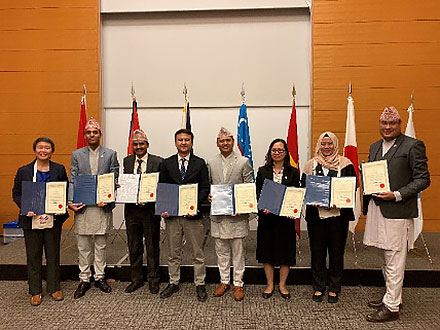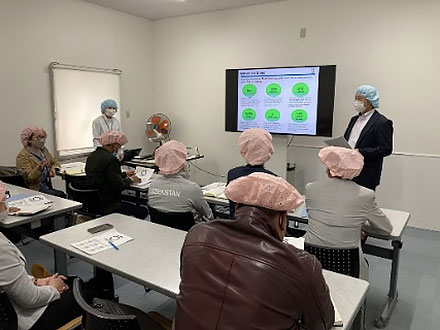Objectives
- Promote respect for the human rights and dignity of vulnerable migrant workers adopting the human security approach.
- Strengthen governance in migrant workers' countries of origin, and contribute to the dissemination of universal values including respect for human rights and dignity and the Rule of Law.
Policies
- Building upon legal and judicial development cooperation and other forms of cooperation for fostering the Rule of Law, JICA supports countries of origin of migrant workers in their efforts to introduce and implement policies and regulations that improve recruitment, employment, and deployment processes in line with international standards.
- JICA also works with businesses to protect the human rights of migrant workers in Japan, as well as those in supply chains of business enterprises abroad.
JICA ACTIVITIES
Capacity Development of government officials of origin countries through Knowledge Co-Creation Program (KCCP)
KCCP " Labor Policy of Migrant Workers and Career Development Support for Returnees to Achieve Economic Growth and Decent Work "


In recent years, the number of migrant workers is increasing. Their skills, techniques and knowledges acquired in host countries are expected to help economic growth of their home countries. There are, however, many challenges found within home countries of migrant workers (i.e., difficulties in finding jobs after returning to their home countries, issues which undermine their human rights and dignity). Until the middle of the 20th century, Japan was an origin country for migrant workers and has shifted to a destination country. Japan is accumulating a wide range of knowledge from experiences of adopting labor and recruitment policies in response to social condition changes and capacity development of migrant workers who can play active roles for the economic growth of their origin countries. Besides sharing such knowledge, it is necessary to consider approaches to enable migrant workers in Japan to thrive in their home countries after they return, such as improvement of the working environment and capacity development of returnees.
The program is mainly designed for government officials in charge of sending migrant workers or supporting career development of returnees. It aims at improving systems and operations related to sending migrant workers and career support for returnees. The course is an opportunity for participants from countries of origin and stakeholders in Japan as a country of destination, to learn from each other, in order to foster the economic growth through decent labour migration and promote the decent work of migrant workers in which their human rights and dignity are given sincere respects.
Promoting proper acceptance of migrant workers highlighting respect for their human rights
Project for Supporting to Connect Job Information for Vietnamese Workers to Work Abroad Under Contract
In order to promote proper acceptance of migrant workers, the key element is the protection of their human rights by mitigating the risk for them to fall into vulnerable positions in a recruitment process, such as being subjected to forced labor or violation of laws and regulations in host countries. Vietnamese technical intern trainees under the Technical Intern Training Program (TITP) are exposed to high risk of being forced to pay exorbitant recruitment and placement fees and related costs. In average, Vietnamese intern trainees paid 688,000 JPY*1 to sending agencies or mediators, which is higher than the average fees of 542,000 JPY that interns from other countries paid. In Vietnam, the access to proper information on TITP, such as living and working conditions and regulations in Japan, and other pieces of information necessary for their preparation have been limited. Against this backdrop, applicants do not have sufficient information on TITP and often rely on unauthorized and malicious mediators, eventually paying exorbitant intermediary fees. The Vietnamese government is making efforts to solve this problem including through amendment of the Law on Contract-Based Vietnamese Overseas Workers.
JICA has been conducting a technical cooperation project since August 2023 with the aim of strengthening Vietnamese government's supporting mechanism for those who wish to work overseas, including future technical intern trainees.
Specifically, JICA is strengthening such mechanism through creating, running, and publicizing a job information system, in which applicants can access to highly transparent information and select sending agencies based on them. Better-informed decision making is expected to allow the applicants to avoid paying exorbitant recruitment and placement fees and related costs. The program will eventually enhance contributions of the migrant workers to the industrial promotion in Vietnam.
In parallel with this project, there is another program to initiate establishment of a voluntary framework advocating elimination of fees for technical intern trainees of TITP. The framework is expected to be joined by sending agencies in Vietnam, supervising organizations and host companies in Japan. The program was proposed with the title "Fair and Ethical Recruitment Initiative (VJ-FERI)" in April 2023 together with the government of Vietnam, the International Labor Organization (ILO), and JP-MIRAI.
*1Result of a survey on fees paid by technical interns (Ministry of Justice): https://www.moj.go.jp/isa/content/001377469.pdf (available in Japanese)




scroll